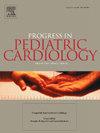Prenatal management of severe tricuspid dysplasia with circular shunt using NSAID therapy: A novel approach
IF 0.8
Q4 PEDIATRICS
引用次数: 0
Abstract
Tricuspid valve dysplasia (TVD) is a rare congenital heart defect that can lead to a life-threatening fetal circulation compromise. We report a case of a fetus with TVD diagnosed at 22 weeks gestation, characterized by severe tricuspid regurgitation, retrograde flow through the ductus arteriosus, and pulmonary regurgitation (circular shunt). Prenatal management with nonsteroidal anti-inflammatory drugs (NSAIDs), both ibuprofen (400–600 mg, every 8 h) and indomethacin (50 mg, every 8 h), was initiated at 28 weeks gestation, and continued until birth, to promote ductal constriction and antegrade flow through it, thus terminating or reducing the circular shunt. Despite the challenging management with NSAIDs, it was possible to achieve a near term delivery and conservative neonatal management.
This case highlights the potential of NSAIDs as a therapeutic option in managing severe TVD with a circular shunt, improving fetal survival and prolonging pregnancy for better neonatal outcomes.
使用非甾体抗炎药治疗环分流严重三尖瓣发育不良的产前管理:一种新方法
三尖瓣发育不良(TVD)是一种罕见的先天性心脏缺陷,可导致危及生命的胎儿循环损害。我们报告一例妊娠22周诊断为TVD的胎儿,其特征是严重的三尖瓣反流、动脉导管逆行血流和肺反流(环形分流)。产前管理使用非甾体抗炎药(NSAIDs),布洛芬(400-600毫克,每8小时)和吲哚美辛(50毫克,每8小时),在妊娠28周开始,并持续到出生,以促进导管收缩和顺行通过它,从而终止或减少循环分流。尽管使用非甾体抗炎药的管理具有挑战性,但仍有可能实现近期分娩和保守的新生儿管理。本病例强调了非甾体抗炎药作为一种治疗选择的潜力,可以治疗严重TVD合并循环分流,提高胎儿存活率,延长妊娠期以获得更好的新生儿结局。
本文章由计算机程序翻译,如有差异,请以英文原文为准。
求助全文
约1分钟内获得全文
求助全文
来源期刊

PROGRESS IN PEDIATRIC CARDIOLOGY
PEDIATRICS-
CiteScore
0.90
自引率
11.10%
发文量
69
审稿时长
75 days
期刊介绍:
Progress in Pediatric Cardiology is an international journal of review presenting information and experienced opinion of importance in the understanding and management of cardiovascular diseases in children. Each issue is prepared by one or more Guest Editors and reviews a single subject, allowing for comprehensive presentations of complex, multifaceted or rapidly changing topics of clinical and investigative interest.
 求助内容:
求助内容: 应助结果提醒方式:
应助结果提醒方式:


